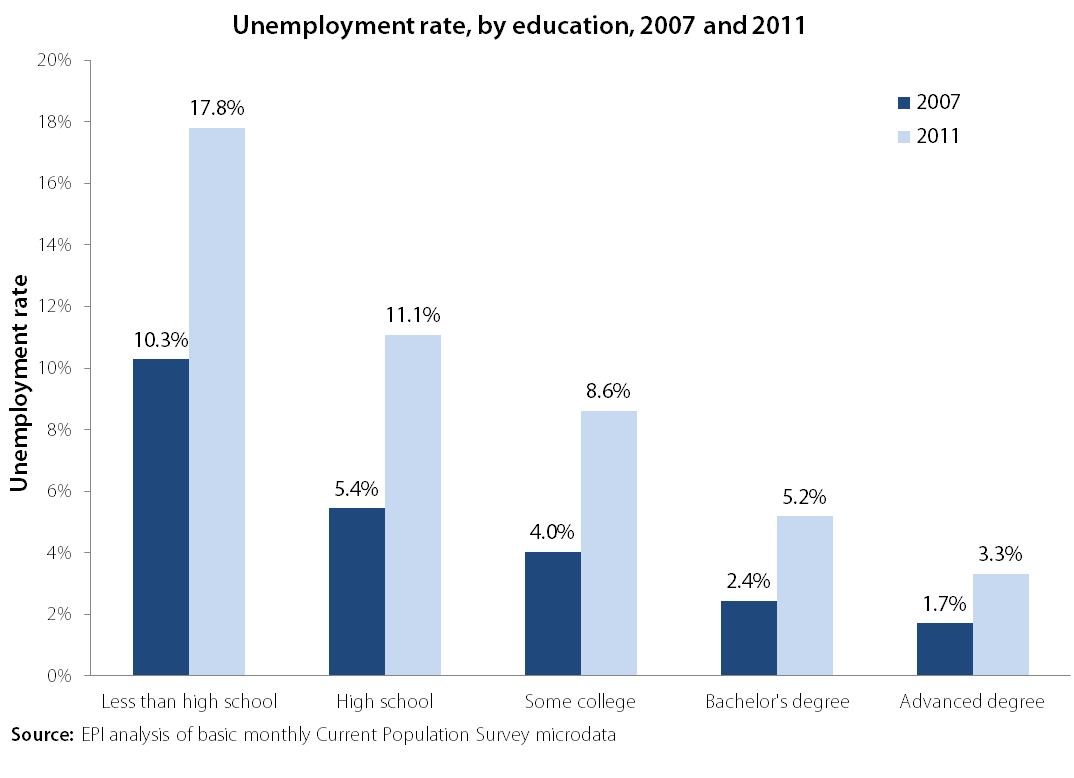In what way is a college degree valuable in a recession?
Dylan Matthews over at Wonkblog used some data we provided to point out “one big flaw” in a report (written by Anthony Carnevale and two co-authors for the Georgetown Center on Education and the Workforce (GCEW)) touting the value of a college education in the recession and recovery. The flaw is, “it doesn’t separate out people who only have a bachelor’s from the 11.3 percent of workers who have an advanced degree beyond a bachelor’s,” when it talks about “college graduates.” Matthews notes that:
“While those with only a BA still did much, much better than people with a high school degree or only some college, they still saw job stagnation during the recession. The only group that continued to gain jobs were those with advanced degrees. Fully 98.3 percent of job gains among those with at least a bachelor’s were realized by those with advanced degrees…”
I want to dig into the issues raised by the GCEW report and the general discussion of the value of a college degree. It is important to separate out two dimensions to the value of a college degree that are frequently conflated, as this report does. One issue is whether an individual will be relatively better off if he or she obtains a college degree and the second issue is the benefit to the economy of a greatly boosted share of the workforce with a college degree (say, if we had 40 or 50 percent rather than the current 33.2 percent with a college degree or further education).
I am totally in favor of policies which facilitate every person’s ability to obtain (and complete) a college degree or other advanced training or skills (i.e., apprenticeships, associate degrees). Those who do advance their education and skills will, on average, be better off in terms of their incomes, employment, health, and be more engaged citizens than those who have not been able to pursue greater education and skills. So, on issue number one there need not be any debate. More education and skills can also be essential for improving social mobility and opportunity and generating a more inclusive economy.
However, if the entire workforce had college educations, we still would have unemployment over 8 percent even though Carnevale and his GCEW co-authors would like to suggest otherwise. They’re clear that the report is “to help advance the discussion and understanding of the effect of education on employment in the Great Recession and recovery. We believe, the role education has had in job losses and job gains in the recession and recovery has not received its due emphasis…” But the report does not address the effect of education on the amount of job losses and gains in the economy. What it does address is how the limited number of jobs available in the recovery was allocated to people with differing education levels.
The graph below (from the Jobs chapter of the forthcoming Economic Policy Institute book The State of Working America, 12th Edition) shows the rise of unemployment by education level between 2007 and 2011 (Matthews posts a similar one). The unemployment rate doubled for every education group. Unemployment rates were lower for those with more education in both 2007 and 2011, which reinforces issue number one that those with more education are relatively better off. But when the financial crisis hit and the housing bubble burst, there was a major decline in the demand for goods and services and therefore, employers responded by producing fewer goods and services and laying off staff and cutting back on hiring. Even if everyone working in construction in 2007 had a college degree construction employers would still have radically cut back employment. Ditto for manufacturing.

It is incorrect and grossly misleading to suggest that higher levels of education would have materially changed the employment outcomes of the aftermath of the financial crisis. Old pal Dean Baker at CEPR makes the same point today.
And, of course, the GCEW report is also highly misleading in reporting labor market outcomes of those with college degrees or advanced degrees as a group and referring to them as college graduates, and then suggesting that those who go to college can obtain those results. In fact, the data are really telling us that everyone needs to get an advanced degree, something which is not a viable path to economic success for the vast majority. Examining wage and employment/unemployment trends for a group, combining those with a terminal BA with those with advanced degrees, and then using these as arguments for the value of a college degree is a common but almost always inappropriate practice. GCEW does this all the time. Readers beware!
The GCEW authors are transparent about their goal in the report and in their work generally:
“We are honored to be partners [with the Lumina Foundation and the Bill and Melinda Gates Foundation] in their mission of promoting post-secondary access and completion for all Americans.” That’s a fine mission and when presenting research a distinction should be made between when post-secondary education’s benefit is for individuals (they are relatively better off) and when the benefit is for the economy/nation as a whole.
Enjoyed this post?
Sign up for EPI's newsletter so you never miss our research and insights on ways to make the economy work better for everyone.